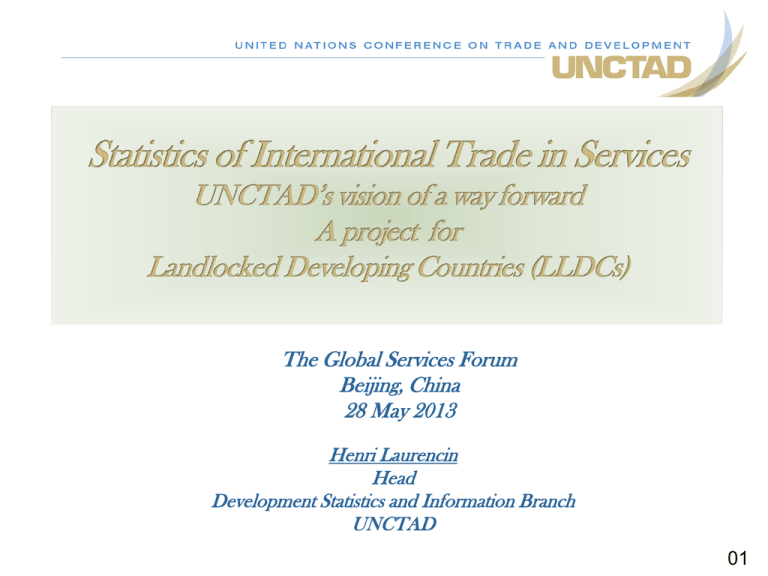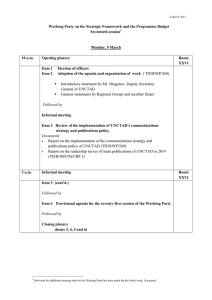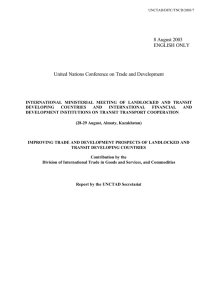The Global Services Forum Beijing, China 28 May 2013 Henri Laurencin
advertisement

The Global Services Forum Beijing, China 28 May 2013 Henri Laurencin Head Development Statistics and Information Branch UNCTAD 101 102 Interagency Task Force on Statistics of International Trade in Services (TFSITS) established in 1994 at the request of the General Agreement on Tariffs and Trade (GATT) and UNCTAD to the UN Statistical Commission (UNSC). Goal: elaborate the statistical requirements of the General Agreement on Trade in Services (GATS). Manual on Statistics of International Trade in Services (MSITS) approved by UNSC in 2002. Goal: set out a statistical framework for the collection and dissemination of trade in services data. MSITS revised in 2010. Goal: make it conform with the System of National Accounts 2008 and the 6th edition of the Balance of Payments and International Investment Position Manual. 103 At the national and regional levels to implement standards on SITS. Workshops, seminars and trainings for compilers (25 during 2010- 2012) by UNSD, UN Regional Commissions, IMF, WTO, Eurostat, countries and other regional organizations. Consultancy (10 during 2010-2012) by EU, IMF, countries. Long-term technical assistance (UNCTAD-UEMOA 2013-2015). Coordination of capacity building activities through inter-agency cooperation in the TFSITS. Pool of experts available for capacity building activities. Development of a Compilers’ Guide for MSITS 2010 (UNSD, in progress). E-learning project (UNCTAD and WTO, in progress). 104 The full implementation of the recommendations on SITS is seen as a long-term goal for most of the countries. A phased implementation of the recommendations of the MSITS 2010 is required. As many administrations and data-compilers are involved in statistics of international trade in services, an effective cooperation at the national and international levels is necessary. Long-term, tailored and comprehensive projects should be developed to complement workshops and seminars. 105 106 Targets a group of countries with common needs and similar statistical capacities in the area of SITS. Favors long-term projects up to five years. Identifies the most urgent needs of the countries in the area of SITS and assesses their capability to address them. Evaluates how the best practices for the compilation of SITS can be adjusted to national circumstances. Defines and implements a tailored action plan for the group. Develops a common IT system to be used across the group for the compilation of SITS if needed. 107 Is coordinated within the Inter-Agency Task Force on SITS and with the relevant organizations. Is complementary to the current capacity building initiatives. Takes full advantage of all available material developed up to now. Promotes a twinning-project method by identifying countries that are willing to provide their knowledge in assisting the beneficiaries' countries. Stimulates continuous transfer of knowledge and experiences amongst beneficiaries' countries to maximize benefits/costs. 108 Clarifies responsibilities of participants in the project. UNCTAD is expected to: • Deliver its expertise • Supervise and coordinate Puts in place necessary instruments to monitor the project and reports on the improvement of SITS released by countries. Last but not least, carries the project forward operating within a tight budget. 109 110 Development of efficient services economy and services trade could significantly improve the economic outlook for LLDCs. A major constraint in formulating relevant policies is the lack of reliable statistics. One third of LLDCs compile annual total trade in services data with more than one year lag or do not at all report data. Only 8 out of 31 LLDCs publish quarterly trade in services statistics. Only 2 are able to compile quarterly data with 4 months lag. 50% of LLDCs provide detailed information on services trade with more than one year delay. Less than a handful of LLDCs report trade in services flows by partner. 111 Assess the capacity of LLDCs to produce SITS and identify those that need capacity building in this critical area. Develop a long-term and comprehensive project tailored to the needs and capacities of LLDcs in the area of SITS on the basis of the approach proposed by UNCTAD. UNCTAD as the leading agency of the project. UNCTAD as coordinator of the project within the Interagency Task Force on Statistics of International Trade in Services (TFSITS). UNCTAD appeals to donors to support and finance the project. UNCTAD to prepare a formal project document and engage UN-OHRLLS, LLDCs and potential donors in the formulation and implementation of the project. 112 113



